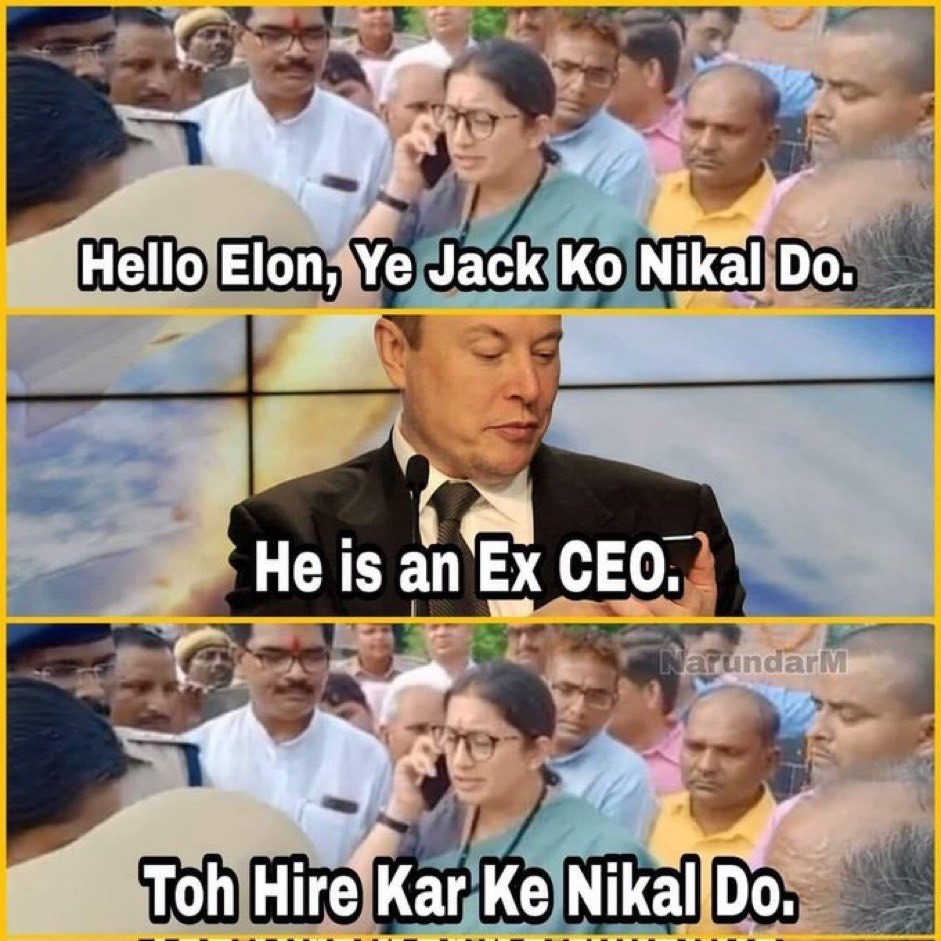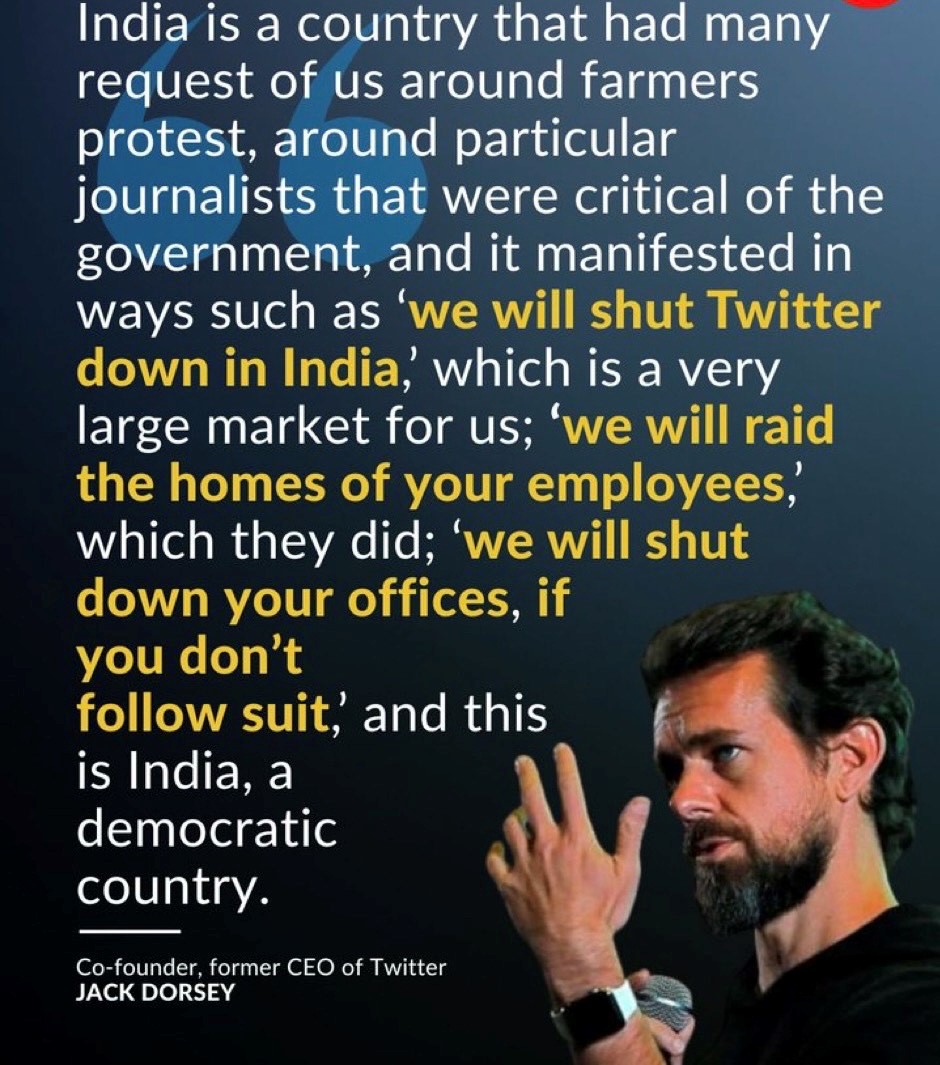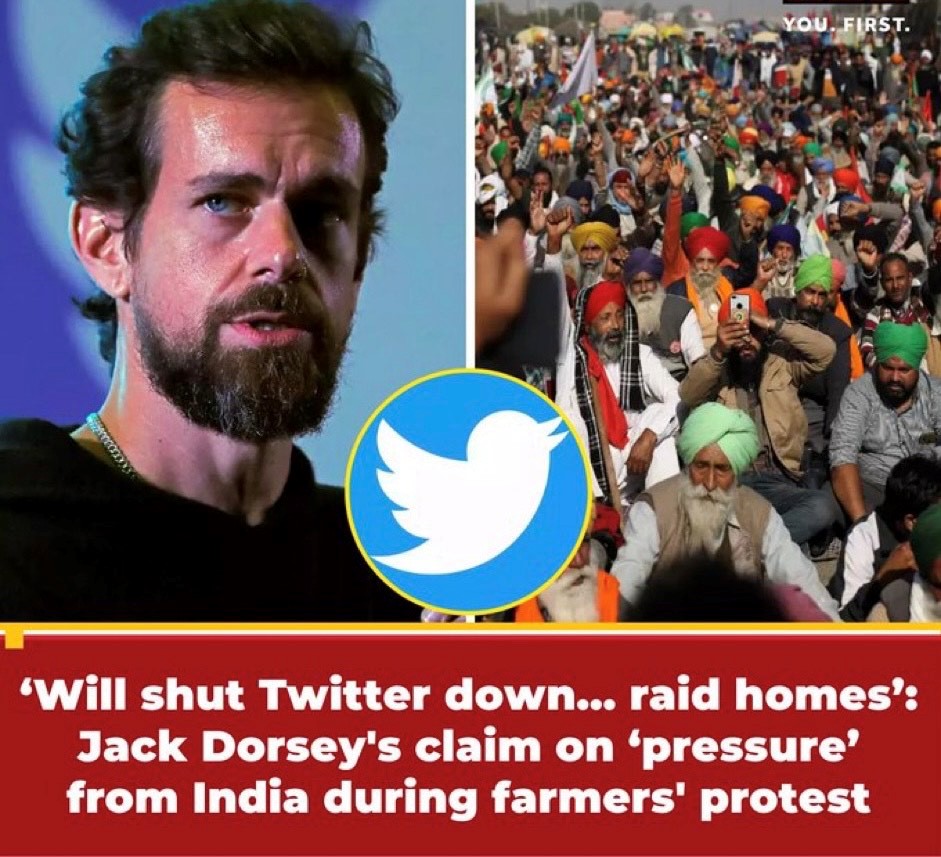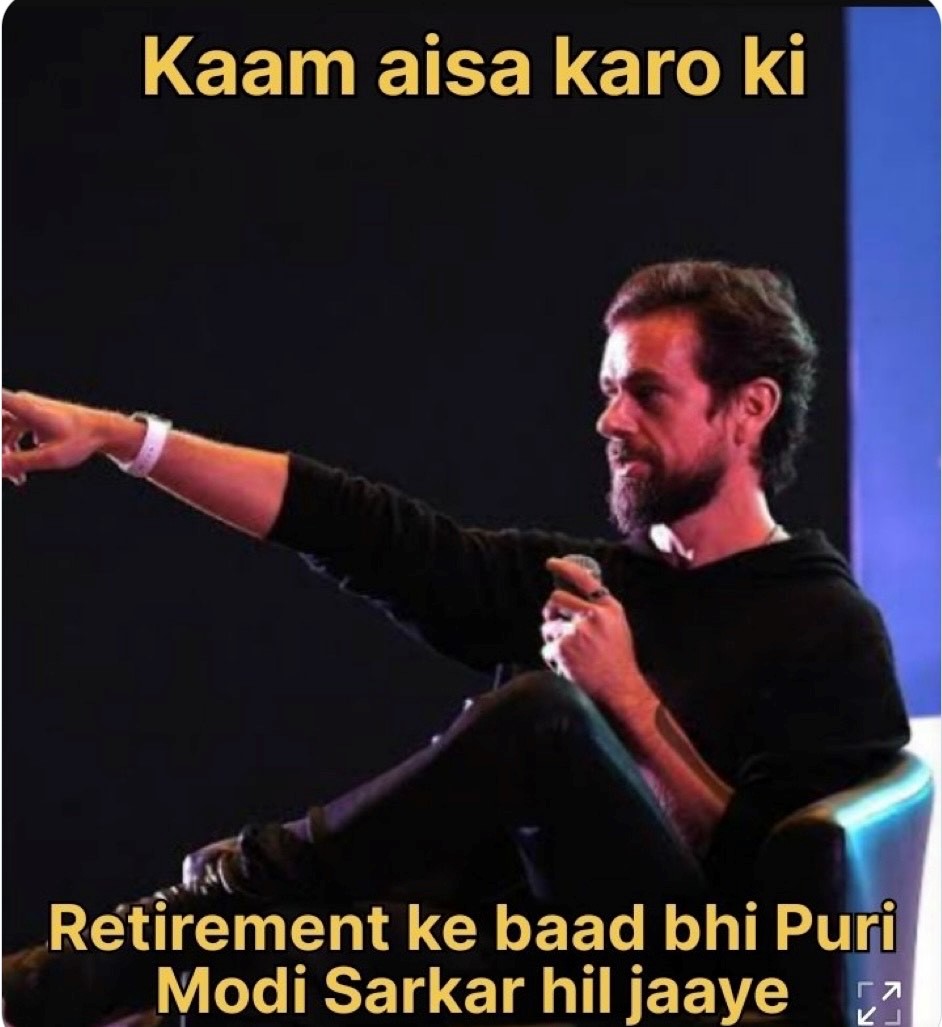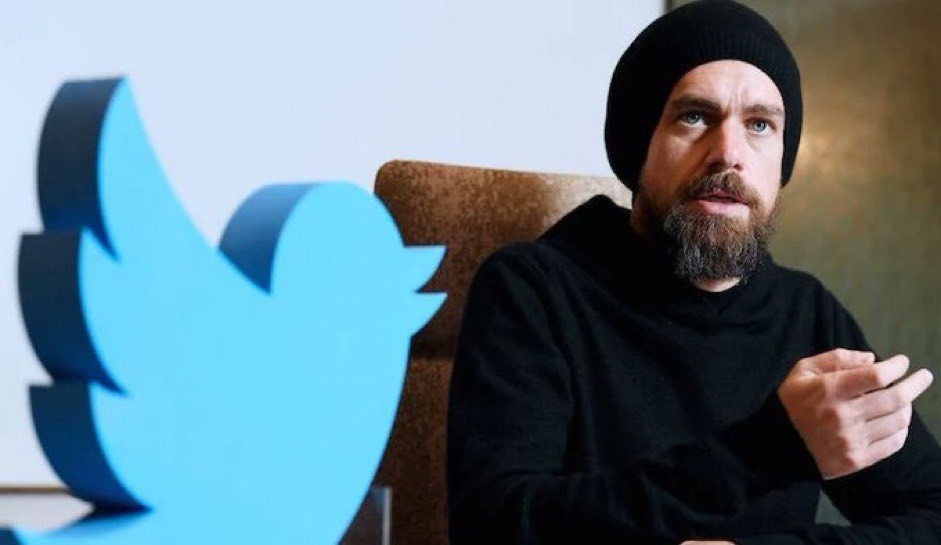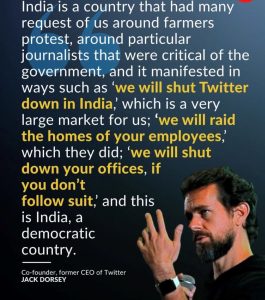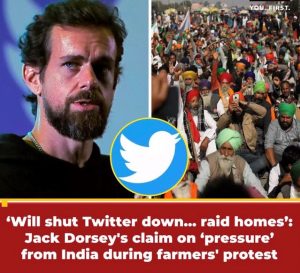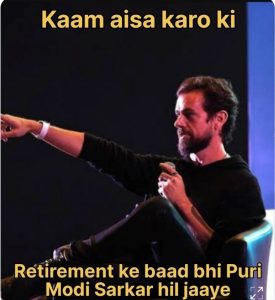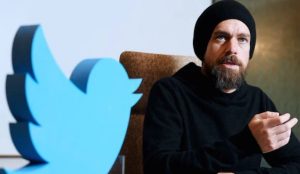HIGHLIGHTS
* Twitter CEO Jack Dorsey in an interview has talked about the Indian government’s requests to censor certain accounts.
* The requests were made during the farmer protests in India that took place between 2020 and 2021.
* The Indian government has however refuted Dorsey’s claims.
* Former Twitter CEO Dorsey accuses India of threatening company
* India lashes out, latest example of tussle with Big Tech
* Big tech companies have struggled to do business in India
* Modi’s government says it always acts in interest of user safety
Twitter co-founder Jack Dorsey has made allegations against the Indian government over requests to censor certain accounts that were critical of the government.
Dorsey said that he received requests during the farmer protests, and there were even threats of shutting down Twitter in India. Union Minister Rajeev Chandasekhar, on the other hand, has called the allegation an “outright lie”.
Twitter’s co-founder and former boss Jack Dorsey has reiterated that the platform received “many requests” from the Indian government to block accounts covering farmers’ protests and those critical of the government.
He has also said that the platform was threatened with “a shut down” and conducting raids at its employees’ homes in the country.
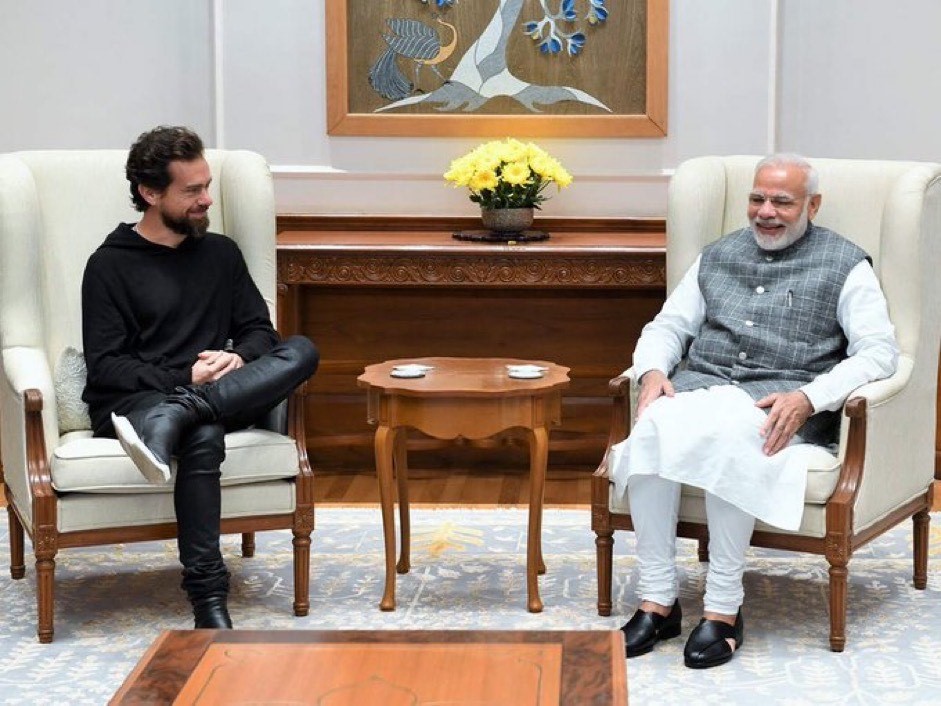
Minister of State for Electronics and IT Rajeev Chandrasekhar responded to Dorsey’s claims, saying that under him, Twitter was in “repeated and continuous violations of India law” and at times “weaponised misinformation”.
It is worth noting that Twitter’s new CEO Elon Musk also has a similar view of India’s social media regulations, having previously called them “strict”. In April this year, Musk had said that he would rather comply with the government’s blocking orders than risk sending Twitter employees to jail.
Musk was possibly referring to India’s Information Technology Rules, 2021, under which a senior representative of social media companies – called the chief compliance officer – can be potentially jailed for violating the norms.
We will shut you down if you don’t follow suit’
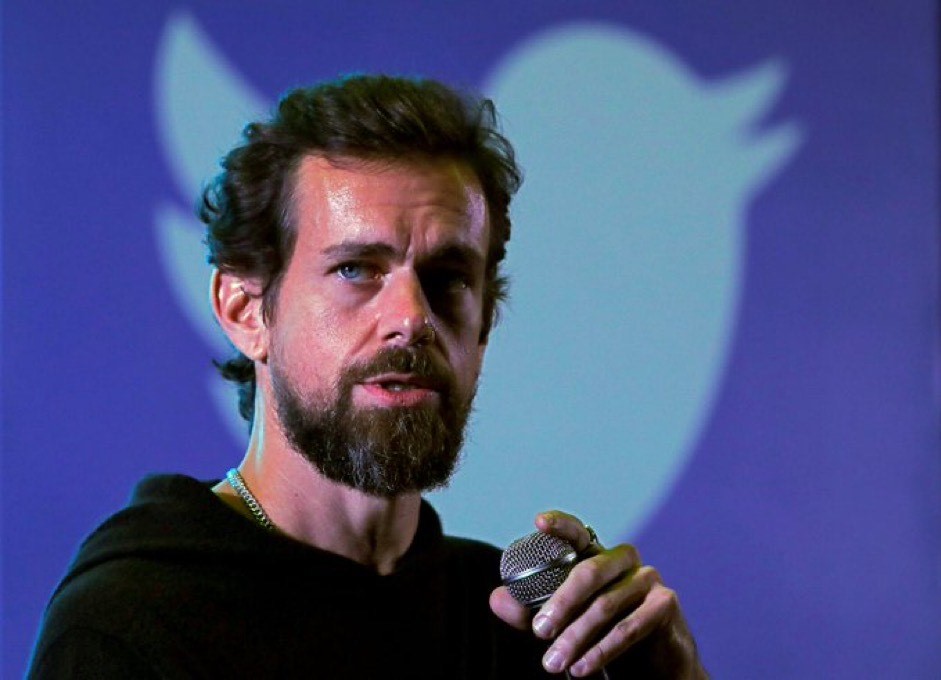
During an interview late Monday night to YouTube channel Breaking Points, when asked about the pressures he had received from foreign governments during his time as CEO of Twitter, Dorsey said, “India is a country that had many request of us around the farmers protest, around particular journalists that were critical of the government, and it manifested in ways such as ‘we will shut Twitter down in India,’ which is a very large market for us; ‘we will raid the homes of your employees,’ which they did; ‘we will shut down your offices, if you don’t follow suit,’ and this is India, a democratic country”.
At the height of the farmers’ protest in the country in 2021, the Centre had asked Twitter to take down nearly 1,200 accounts for alleged “Khalistan” links. Before that, it had asked the platform to take down more than 250 accounts.
Twitter had responded by blocking some of the accounts but subsequently unblocked them, which had irked the IT ministry.

Later in its reply, Twitter had refused to block these accounts further citing freedom of speech on its platform.
The reply, however, had not gone down well with the Government, which had said that the platform could not possibly “assume the role of a court and justify non-compliance”.
In May 2021, days after Twitter flagged some posts by ruling party leaders alleging a Congress plot to malign the Prime Minister and the Central Government as “manipulated media”, a team of Delhi Police’s Special Cell — working under the Union Home Ministry — knocked on the doors of Twitter India’s Delhi and Gurgaon offices to ostensibly serve the social media platform a notice.
‘Outright lie’ by Dorsey: MoS IT Rajeev Chandrasekhar

Reacting to Dorsey’s claims, Chandrasekhar said that no one from Twitter went to jail nor was the platform “shutdown” despite the fact that they were in “non-compliance with law repeatedly from 2020 to 2022 and it was only in June 2022 when they finally complied”.
“Dorsey’s Twitter regime had a problem accepting the sovereignty of Indian law. It behaved as if the laws of India did not apply to it,” Chandrasekhar said. “India as a sovereign nation has the right to ensure that its laws are followed by all companies operating in India.”
He added that the Centre was “obligated” to issue takedown orders during the farmers’ protest in 2021 since there was “a lot of misinformation and reports of genocide which were definitely fake”.
“Such was the level of partisan behaviour on Twitter under Jack’s regime, that they had a problem removing misinformation from the platform in India, when they did it themselves when similar events took place in the USA,” he said.
Growing trend of Online Censorship
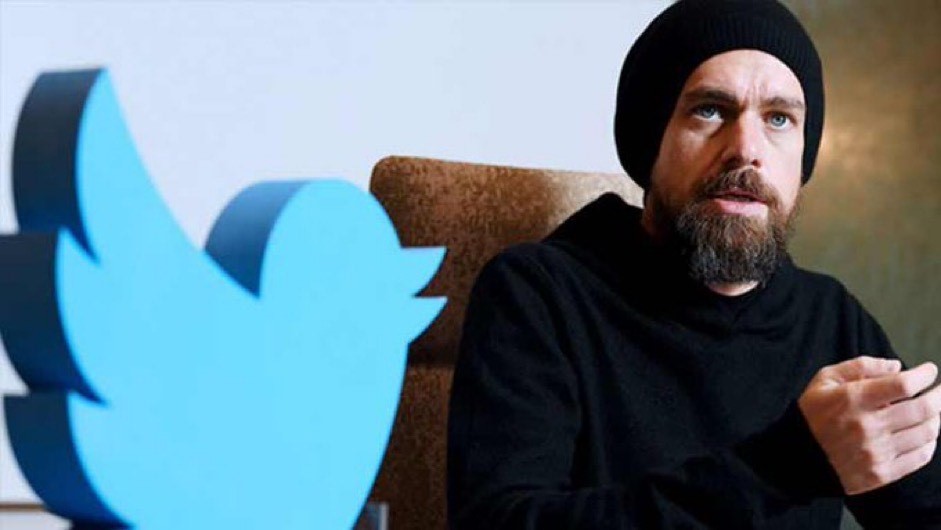
There has been a significant surge in legal demands being made by India — from various courts and the government — to remove content from Twitter between 2014 and 2020, an analysis of Twitter’s global transparency reports by The Indian Express had earlier shown.
Incidentally, in the same time period, the number of content blocking orders issued to social media companies by the government has also increased by almost 2,000 per cent, data shared with Parliament showed, highlighting the growing trend of online censorship in India.
In the first six months of 2021, Twitter was asked by various Indian courts and the government to block a little more than 4,900 tweets — this coincided with the company blocking more than 250 accounts in relation to sharing “provocative” tweets over the then ongoing farmers’ protests and the company receiving orders from the government to take down some tweets critical of the government’s handling of Covid-19.
Twitter suing the Centre
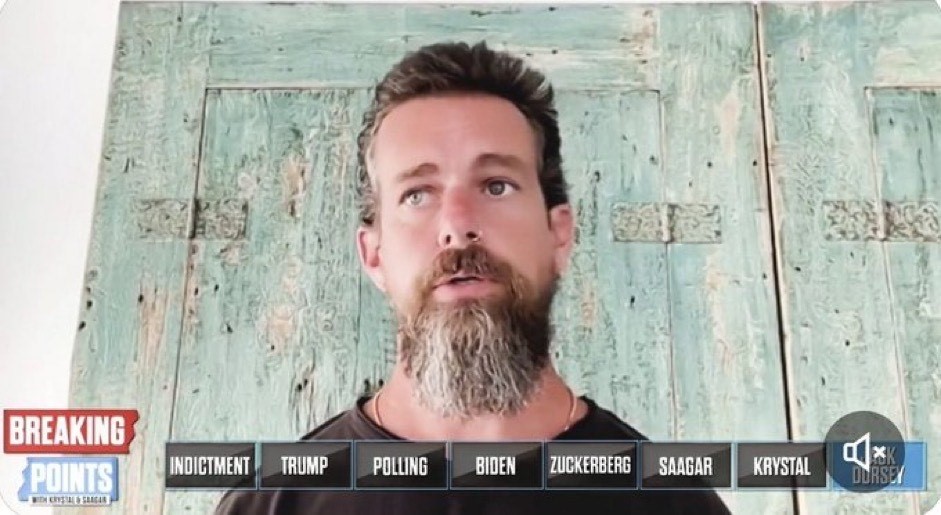
In July 2022, Twitter initiated legal action against some of the government missives ordering it to take down certain content posted on the microblogging site.
Alleging disproportionate use of power by officials, the social media company moved the Karnataka High Court Tuesday against the Ministry’s content-blocking orders issued under Section 69 (A) of the Information Technology Act, 2000.
Jack Dorsey Interview
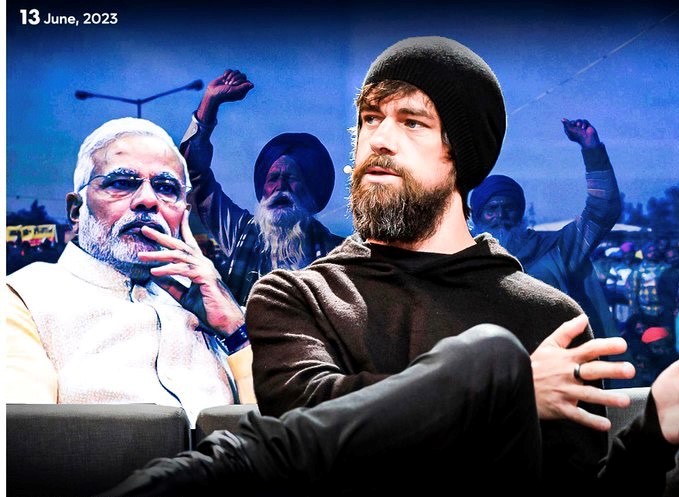
In an interview with YouTube channel Breaking Points, Dorsey responded to questions asked about receiving any pressure from foreign governments.
Here, he said that the Indian government made many requests to censor accounts of journalists that were critical of the government during the farmer protests. The farmer protests took place in India between 2020 and 2021 during which Dorsey was serving as the CEO of Twitter.
The Indian government also made threats to shut Twitter down in the country, and to raid the homes of its employees, as per Dorsey. “We will shut down your offices if you don’t follow suit… We will raid homes of your employees, which they did,” Dorsey was quoted as saying in the interview. “And this is India, a democratic country,” he added. This did happen though in 2021 when Twitter offices were raided over the social platform labelling one BJP spokesperson’s tweet as “manipulated media”.
Indian government refutes Dorsey’s claims
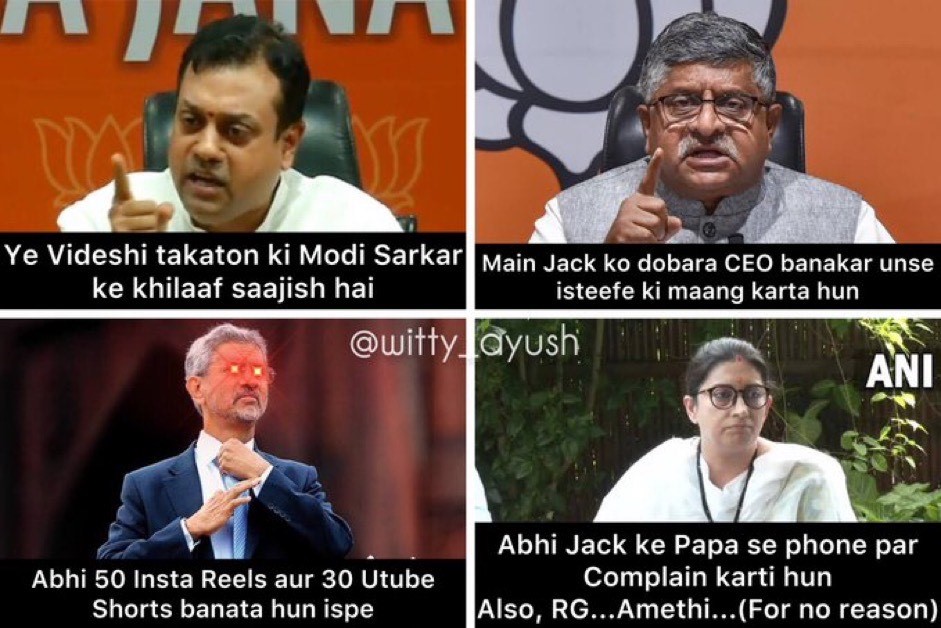
Rajeev Chandasekhar, Minister of State for Skill Development and Entrepreneurship of India, refuted the claims made by Dorsey in a tweet.
Chandrashekhar said that “Dorsey and his team were in repeated and continuous violations of Indian law from 2020 to 2022. The company finally complied with India’s laws in June 2022. He added that Dorsey’s Twitter had a problem with India’s sovereign law.”
On the requests made to censor tweets, the minister said that these were made to stop the spread of misinformation on the platform. During the protests there were fake information spreading on Twitter and the government was “obligated to remove misinformation from the platform because it had the potential to further inflame the situation based on fake news.”
“There is ample evidence now in public domain abt Jacks twitter’s arbitrary, blatantly partisan n discriminatory conduct and misuse of its power on its platform during that period,” he added in the tweet.
Dorsey is no longer the CEO of Twitter as he quit from the position last year. The position was taken over by Indian-origin Parag Agrawal. Twitter was later bought by Elon Musk after which he fired Agrawal followed by Dorsey stepping down from the company’s board of directors.
Faqs
1) ’Outright lie’: Govt rejects ex-Twitter CEO Dorsey’s ‘shut down’, ‘raid’ claims.Details?
Ans) Dorsey alleged that Twitter was threatened with shut downs in India, Nigeria and Turkey unless it complied with orders to restrict accounts.
Union minister Rajeev Chandrashekar on Tuesday rejected Twitter co-founder Jack Dorsey’s claim that the Indian government put pressure on the social media company to block accounts covering farmers’ protest, calling it an “outright lie” and “an attempt to brush out that very dubious period” of firm’s history.
In a YouTube Show ‘Breaking Points with Krystal and Saagar’, the former Twitter boss alleged that the Indian government threatened to shut down the social media platform in India and raid the houses of staff.
When asked if he had faced any pressure from foreign governments, Dorsey, who stepped down from Twitter’s board last year, replied, “India for example, India is one of the countries which had many requests around farmers protests, around particular journalists which were critical of the government, and it manifested in ways such as ‘we will shut Twitter down in India’… ‘we would raid the homes of your employees’, which they did; ‘we will shut down your offices if you don’t follow suit’. And this is India, a democratic country.”
Responding to the serious allegations, Chandrashekar said Twitter under Jack Dorsey repeatedly violated Indian law between 2020-22 and complied only in June 2022, weeks after billionaire investor Elon Musk initiated an acquisition of the social media giant. He alleged that Twitter had a problem accepting the “sovereignty of India law” and behaved “as if the laws of India did not apply to it.”
“No one went to jail nor was Twitter ‘shutdown’…India as a sovereign nation has the right to ensure that its laws are followed by all companies operating in India,” the Union minister of state for Electronics and Technology said in a tweet.
There was a lot of misinformation and fake reports of genocide doing rounds on Twitter during the farmers’ protest in 2021, the minister said, and the Indian government was “obligated to remove misinformation from the platform because it had the potential to further inflame the situation based on fake news.”
Chandrashekhar pointed to Twitter’s action prompt action in removing misinformation during the US Capitol attack in January 2020 but they had a “problem removing misinformation from the platform in India,” alleging partisan behaviour of the America-based company under Jack Dorsey.
“To set the record straight, no one was raided or sent to jail. Our focus was only on ensuring the compliance of Indian laws,” he asserted.
To be sure, Delhi Police officers visited Twitter offices in South Delhi’s Lado Sarai and Golf Course Road in Gurugram in May 2021 in connection with a tweet by Bharatiya Janata Party’s (BJP’s) national spokesperson Sambit Patra about an alleged toolkit released by the Congress party that the microblogging site tagged as “manipulated media.” A police team from Lodhi Colony’s special cell visited the offices to secure the participation of Twitter’s managing director Manish Maheshwari as part of the probe.
2) ‘Outright lie’: India denies Dorsey’s claims it threatened to shut down Twitter.Details?
Ans) India threatened to shut down Twitter in the country unless it complied with orders to restrict accounts critical of the handling of farmer protests, co-founder Jack Dorsey said, an accusation Prime Minister Narendra Modi’s government called an “outright lie”.
Dorsey, who quit as Twitter CEO in 2021, said on Monday that India had also threatened the company with raids on employees if it did not comply with government requests to take down certain posts.
“It manifested in ways such as: ‘We will shut Twitter down in India’, which is a very large market for us; ‘we will raid the homes of your employees’, which they did; And this is India, a democratic country,” Dorsey said in an interview with YouTube news show Breaking Points.
Deputy Minister for Information Technology Rajeev Chandrasekhar, a top ranking official in Modi’s government, lashed out against Dorsey in response, calling his assertions an “outright lie”.
“No one went to jail nor was Twitter ‘shut down’. Dorsey’s Twitter regime had a problem accepting the sovereignty of Indian law,” he said in a post on Twitter.
Dorsey’s comments again put the spotlight on the struggles faced by foreign technology giants operating under Modi’s rule. His government has often criticized Google, Facebook and Twitter for not doing enough to tackle fake or “anti-India” content on their platforms, or for not complying with rules.
The former Twitter CEO’s comments drew widespread attention as it is unusual for global companies operating in India to publicly criticise the government. Last year, Xiaomi in a court filing said India’s financial crime agency threatened its executives with “physical violence” and coercion, an allegation which the agency denied.
Several top Indian officials criticized Dorsey’s remarks and Twitter’s past handling of misinformation. But many opposition lawmakers accused the government of muzzling the voices of farmers during the 2020-2021 protest, one of the severest challenges Modi has faced.
The government eventually gave in to the protesters and repealed laws that they said were anti-farmer.
“It shows that everyone who dares to show the smallest bit of courage will be suppressed,” said Supriya Shrinate, a spokesperson for the main opposition Congress party.
Dorsey also mentioned similar pressure from governments in Turkey and Nigeria, which had restricted the platform in their nations at different points over the years before lifting those bans.
Twitter was bought by Elon Musk in a $44 billion deal last year.
Chandrasekhar said Twitter under Dorsey and his team had repeatedly violated Indian law. He did not name Musk, but added Twitter had been in compliance since June 2022.
BIG TECH VS MODI.
Modi and his ministers are prolific users of Twitter, but free speech activists say his administration resorts to excessive censorship of content it thinks is critical of its working. India maintains its content removal orders are aimed at protecting users and sovereignty of the state.
The public spat with Twitter during 2021 saw Modi’s government seeking an “emergency blocking” of the “provocative” Twitter hashtag “#ModiPlanningFarmerGenocide” and dozens of accounts.
Twitter initially complied with the government requests but later restored most of the accounts, citing “insufficient justification”, leading to officials threatening legal consequences.
In subsequent weeks, police visited a Twitter office as part of another probe linked to tagging of some ruling party posts as manipulated. Twitter at the time said it was worried about staff safety.
Dorsey in his interview said many India content take down requests during the farmer protests were “around particular journalists that were critical of the government.”
Since Modi took office in 2014, India has slid from 140th in World Press Freedom Index to 161 this year, out of 180 countries, its lowest ranking ever.
3) India threatened to shut Twitter down, co-founder Jack Dorsey says.Details?
Ans) India threatened to shut Twitter down unless it complied with orders to restrict accounts critical of the government’s handling of farmer protests, the social media platform’s co-founder Jack Dorsey has said, an accusation Narendra Modi’s government called an “outright lie“.
Dorsey, who quit as Twitter’s chief executive in 2021, said on Monday that India had also threatened the company with raids on employees if it did not comply with government requests to take down certain posts.
“It manifested in ways such as: ‘We will shut Twitter down in India’, which is a very large market for us; ‘We will raid the homes of your employees’, which they did; and this is India, a democratic country,” Dorsey said in an interview with the YouTube news show Breaking Points.
India’s deputy minister for information technology, Rajeev Chandrasekhar, responded by calling Dorsey’s assertions an “outright lie”.
“No one went to jail nor was Twitter ‘shut down’. Dorsey’s Twitter regime had a problem accepting the sovereignty of Indian law,” he said in a post on Twitter.
Dorsey’s comments again put the spotlight on the struggles faced by foreign technology giants operating under Modi’s rule. His government has often criticised Google, Facebook and Twitter for not doing enough to tackle fake or “anti-India” content on their platforms, or for not complying with rules.
The former Twitter chief executive’s comments drew widespread attention as it is unusual for global companies operating in India to publicly criticise the government. Last year, the Chinese electronics firm Xiaomi said in a court filing that India’s financial crime agency had threatened its executives with “physical violence” and coercion, an allegation the agency denied.
Dorsey also mentioned similar pressure from governments in Turkey and Nigeria, which had restricted the platform in their nations at different points over the years before lifting those bans.
Twitter was bought by Elon Musk in a $44bn (£35bn) deal last year.
Chandrasekhar said Twitter under Dorsey and his team had repeatedly violated Indian law. He didn’t name Musk, but said Twitter had been in compliance since June 2022.
Modi and his ministers are prolific users of Twitter, but free speech activists say his administration resorts to excessive censorship of content it thinks is critical of its working. India maintains that its content removal orders are aimed at protecting users and sovereignty of the state.
In 2021 Modi’s government sought an “emergency blocking” of the “provocative” Twitter hashtag “#ModiPlanningFarmerGenocide” and dozens of accounts. Farmers’ groups had been protesting against new agriculture laws at the time, one of the biggest challenges faced by the Modi government.
The government later gave in to the farmers’ demands.
Twitter initially complied with the government requests but later restored most of the accounts, citing “insufficient justification”, leading to officials threatening legal consequences.
In subsequent weeks, police visited a Twitter office as part of another inquiry linked to tagging of some ruling party posts as manipulated. Twitter at the time said it was worried about staff safety.
Dorsey in his interview said many India content takedown requests during the farmer protests were “around particular journalists that were critical of the government”.
Since Modi took office in 2014, India has slid from 140th in the World Press Freedom Index to 161st this year, out of 180 countries, its lowest ranking ever.
… we have a small favour to ask. Tens of millions have placed their trust in the Guardian’s fearless journalism since we started publishing 200 years ago, turning to us in moments of crisis, uncertainty, solidarity and hope. More than 1.5 million supporters, from 180 countries, now power us financially – keeping us open to all, and fiercely independent. Will you make a difference and support us too?
Unlike many others, the Guardian has no shareholders and no billionaire owner. Just the determination and passion to deliver high-impact global reporting, always free from commercial or political influence. Reporting like this is vital for democracy, for fairness and to demand better from the powerful.
And we provide all this for free, for everyone to read. We do this because we believe in information equality. Greater numbers of people can keep track of the events shaping our world, understand their impact on people and communities, and become inspired to take meaningful action. Millions can benefit from open access to quality, truthful news, regardless of their ability to pay for it.
Whether you give a little or a lot, your funding will power our reporting for the years to come.

